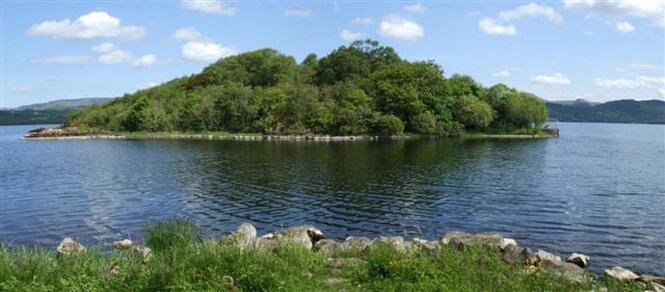 ‘The Lake Isle of Innisfree’ by William Butler Yeats I will arise and go now, and go to Innisfree, And a small cabin build there, of clay and wattles made; Nine bean-rows will I have there, a hive for the honey-bee, And live alone in the bee-loud glade. And I shall have some peace there, for peace comes dropping slow, Dropping from the veils of the morning to where the cricket sings; There midnight’s all a glimmer, and noon a purple glow, And evening full of the linnet’s wings. I will arise and go now, for always night and day I hear lake water lapping with low sounds by the shore; While I stand on the roadway, or on the pavements grey, I hear it in the deep heart’s core. Source: The Collected Poems of W. B. Yeats (1989) Whilst children enjoy the challenge of discovering and writing about previously unknown places, there is, of course, huge value in encouraging them to write about places that they know intimately. Part of the skill in doing this is to convey to the reader not only what the place makes the writer think and feel, but how and why it does so. In the Chernobyl activity, the children are required to put themselves into other people’s shoes and allow their imaginations to take them on a journey; there is, however, a recognizable historical context which helps the reader to follow their train of thought. When they attempt to write poetry about places that are particular to them, on the other hand, they need to bear in mind that few, if any, of their readers will have been there; there is, therefore, a greater need to firm up the imagery and avoid obscuring the picture with too many personal allusions to which the reader may struggle to relate. W B Yeats’ ‘The Lake Isle of Innisfree’ is a particularly useful poem to use as an exemplar in this regard. The relative isolation and inaccessibility of setting of Yeats’ famous poem - an uninhabited island within Lough Gill, County Sligo - ensures that number of people who know the place at first hand must be vastly smaller than the number who are familiar with the poem. And yet, whoever reads these twelve simple lines is instantly transported there, thanks to the skill of Yeats’ expression. From the urgency of the repeated ‘...and go...’ of the first line through to the ‘deep heart’s core’ of the conclusion, we are attuned to a heartbeat of the place itself, its ‘lake water lapping with low sounds by the shore’ evoked in the steady, loosely iambic rhythm. We hear its sounds shimmering in images such as the ‘bee-loud glade’ and can almost feel the texture and weight of the silence ‘Dropping from the veils of the morning’. By touching all of our senses and allowing them to blend into each other - a technique known as ‘synaesthesia’ - Yeats enables us to feel his own sense of the aliveness of the lake isle, even when imagined from a distance. (Importantly, the poem is written not in situ, but from the ‘pavements grey’ of Dublin: it is a daydreamer’s fantasy, but the subject is no less perceptible or ‘real’, either to the poet or to his reader.) When I looked at ‘The Lake Isle of Innisfree’ with a class of Year 7 pupils, I asked them to spend five minutes doing a rough sketch of anything of interest that they could visualise of the poem’s setting. Some chose to produce landscapes of the island, the lake and a backdrop of mountains. Others focused in on one detail, such as the cabin, the nine bean-rows or the beehive. One produced a bird’s-eye view, rather like a map, having wanted to imagine being one of the linnets that Yeats refers to. The children looked at each other’s sketches and I asked them to discuss with each other whose picture they thought best encapsulated Innisfree. Plenty of lively discussion ensued, but the inevitable conclusion was that it was, of course, impossible to know. Whilst they had no trouble identifying who amongst them could ‘draw the best’, they were very much alive to the truth that, for the purposes of this exercise, artistic skill did not matter. Thanks to a combination of both the things that Yeats does describe and that which he withholds from us, the reader can form their own mental image of the poem’s setting. This coming-together of what is deeply personal to the poet and what the reader can imagine of it is what contributes much of the magic to the poem. I therefore asked the children, when they set to writing their own place poems, to try and focus upon settings that as few other readers as possible would know. In particular, I wanted them to avoid places that any of their friends would know. That way, their poems would hold a truth for the writer that nobody else could deny and, just as importantly, give the reader their own mental image of the place untainted by pre-existing experience: A Yorkshire Morning The constant rhythm of a train Pulsing never-endingly in my ears The pistons turning their unfinishing circles Disturbing the crisp morning air As I poke my head out of the carriage window The freezing air buffets my face I gaze out over the Yorkshire Moors And observe their unique beauty It has been snowing up on the moors The dry stone walls, the cottages All white and covered with snow And perfectly formed Out on the moors it is so open With the sun low in the sky The silver morning light Streams in through the carriage windows. Edward (aged 11) The North York Moors Up north near the coastline Where the slugs are black as night And the moors are wet with dew in early hours Is a land of purple velvet And of clear cloudless skies And vermillion blazing sunsets like a flame. The distant rolling breakers And the misty, silent air Turn a landscape to a dream in many eyes And the hilly flawless fields And the winding country roads Still sit there Sit there As the days and nights go by. Hugo (aged 11) Grandad’s Bridge I can be all alone now there’s no one else here My brother left an hour ago leaving me here The moors are dotted with animals, with horses and cows I can be alone now, alone with the cows Golcar is in the distance bathed in golden light My Granddad would always say ‘The sun always shines on Golcar; it’s always in the light’ Behind lies the twisting, turning path, bordered by pine trees I raced my brother through them, through the turning twisting trees He won of course; he’s much bigger than me But I’ll never give up, he won’t always beat me Grandad built the bridge himself He also built the house himself And that makes the whole thing even better I’m going back now, I’m feeling much better Benedict (aged 12) These three boys, who quite coincidentally chose different settings in Yorkshire as their subject matter, have responded to the task in particularly interesting ways. The familiar and universal blends seamlessly with the deeply personal, with each writer truly tapping into the concept of poetry as ‘painting a picture with words’. Benedict was convinced that his poem was ‘rubbish’ because he had not been able to think of any good rhymes and so he had chosen to end the lines of each couplet with a repeated word. I told him that, far from being rubbish, his use of repetition was reminiscent another of Yeats’ poems, a poem with which he was unfamiliar up till that point: ‘He Wishes for the Cloths of Heaven’ by W B Yeats Had I the heavens’ embroidered cloths, Enwrought with golden and silver light, The blue and the dim and the dark cloths Of night and light and the half-light, I would spread the cloths under your feet: But I, being poor, have only my dreams; I have spread my dreams under your feet; Tread softly because you tread on my dreams. Source: The Collected Poems of W. B. Yeats (1989) Benedict still took some convincing that it wasn’t ‘cheating’ or ‘lazy’ to rhyme a word with the same word, but once I had shown him how Yeats himself had done just that to beautiful effect, he was at least partly reassured. The key thing is that, however he chose to reconstruct it, ‘grandad’s bridge’ has now been reconstructed through Benedict’s words to become immortalised as ‘Grandad’s Bridge’, and without his words, it would not have been. It would just be one of the countless places out there in the world about which no words have ever been written. Reading all three of these children’s poems reminds me of the point made by Ted Hughes about his own poem ‘The Thought-Fox’: “[I]n some ways, my fox is better than an ordinary fox. It will live for ever, it will never suffer from hunger or hounds. I have it with me wherever I go. And I made it. And all through imagining it clearly enough and finding the living words.” Poetry in the Making (Faber & Faber, 2008) If children can be encouraged to trust their own memories, their instincts and their senses, they, like Hughes, can discover through writing of poetry the thrill that comes from making something physical and permanent out of something mental and transitory. Using remembered places as inspiration makes for a great starting point.
0 Comments
|
AuthorSixteen years of teaching poetry to children have furnished me with a wealth of ideas. Do dip in and adapt any of these for your own lessons. Archives
April 2020
Categories
All
|


 RSS Feed
RSS Feed
